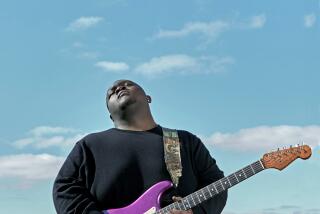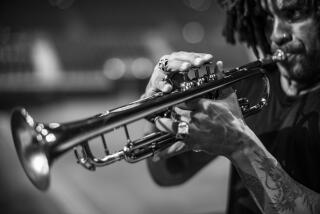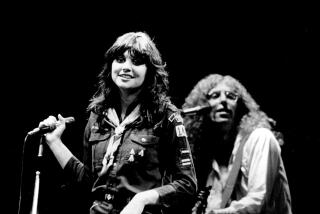Young Guitarist Is Still in Awe of Rapid Rise to Top
- Share via
SAN DIEGO — What a year it has been for guitarist Mark Whitfield. At this time last year, Whitfield, who plays two shows at Elario’s tonight, was virtually unknown to music fans outside New York City, his home at the time.
Then his association with such other young lions as trumpeter Wynton Marsalis landed him coverage in Time magazine, the New York Times and other prestige publications--just in time for the release of his first album, “The Marksman,” in September.
The album is getting raves from critics who appreciate Whitfield’s mature and restrained continuation of jazz guitar traditions that began with Charlie Christian and continued through Wes Montgomery, Grant Green, Jim Hall, George Benson and others.
Suddenly Whitfield, just 24, is enjoying a heady brand of success as one of the newest members of a nationally acclaimed traditional jazz brat pack. He toured Japan last month with singer Carmen McRae, and television appearances are booked with Johnny Carson, Arsenio Hall and David Letterman. Whitfield has also taped a “Nightline” program, hosted by closet jazz guitarist Forest Sawyer and featuring a Whitfield duet with Benson.
All that attention could go to a young man’s head, but Whitfield takes it in stride, keeping his reverence for the legends who came before him. To him, they are like gods.
“It’s taken so much studying and appreciation of the founding fathers of jazz to get where I am that, along the way, I’ve fallen in love with all of their music, personalities, contributions,” he said. “I hold them most high in my own estimation of their contribution to the art.
“If I was Freddie Hubbard’s age and grew up in the ‘60s, I might look at them differently--to stand there and talk to ‘Trane is different than to revere him and study his music 20 years after he’s dead. Us young guys think of these people as superhuman, and their contribution as being priceless.”
Whitfield’s smooth, melodic style shows amazing polish for someone his age, yet he doesn’t showboat his talents. He also stands out for being a jazz purist among peers whose music mirrors broader influences ranging from rock to rap. He has consciously honed his approach in another direction.
“When I first went to Berklee (a music school), I was 16, and all I could do was play really fast,” Whitfield said. “I went through a period where I liked to play like Hendrix, and I listened to ‘70s rock bands like Aerosmith, and rap. I had played a lot of classical music on acoustic bass, and I had strength in my fingers. I spent three or four years working on playing fast, and I got known just for playing fast.
“But my parents are real big jazz fans, and they would take me to see Basie, Ellington, Joe Pass. I knew there was something different about jazz musicians and their virtuosity.
“You had to have a knowledge of theory and harmony like a classical player but be able to improvise. I realized there wasn’t much lyricism, soul or expression in my playing. I knew I’d have to take a strong approach scholastically to learn the music and history. I felt that, to get a strong foundation, I had to go right to the source.
“When I joined (organist, composer) Jack McDuff’s band, I began to pay attention to Wes Montgomery, realizing that less is a lot more in most settings. I can certainly play fast whenever I want, but it’s easier to develop a sound, a style, if you handle solos as conversations. They need an intro, a climax and an exit. That’s what I had to start developing. I was just getting to that when we started recording the record last April and May.”
For his debut, Whitfield mixed a few of his favorite jazz tunes by other composers, including Ellington’s “In a Sentimental Mood,” with six of his own songs. He recorded with Marsalis’ rhythm section: Marcus Roberts on piano, Reginald Veal on bass and Herlin Riley on drums.
According to Whitfield, the sound on the album was carefully tailored with the help of veteran producer Tommy LiPuma to make a strong first impression that doesn’t reflect the full diversity of his playing.
“I wanted to develop something that hadn’t been messed with much in a quartet setting,” he said. “I didn’t do much chord work, and I played relaxed, not fast. I kind of tried to set a mood like a singing horn.”
Like, say, 1960s Miles Davis?
“That’s along the lines of what I was thinking, Whitfield said. “Marcus and those guys bring that sound to life.
“When you come to see me play, though, I’ll do something with my thumb like Wes Montgomery, then some solo music like Joe Pass. I might even play Charlie Christian’s ‘Air Mail Special.’ When you’re playing live, there’s more time to develop a show and an audience and a sound than on record.”
To reach a larger audience, Whitfield reworked some of his music to gain exposure on light jazz stations, including KIFM (98.1) in San Diego. Three songs were edited to commercial radio length--under four minutes--which cut two of them virtually in half.
“Marcus will be mad. A few of his solos disappeared,” Whitfield said. “Sitting there and chopping up the music was painful, but it does pay off in the end. Stations in New York, L.A., throughout the country are playing it. Even some of the rap stations are playing the edited versions.”
Whitfield’s one night in San Diego is part of a West Coast tour that will take him to Los Angeles, San Francisco and Seattle later this month, then back to Catalina’s in Los Angeles for a week with Carmen McRae in January.
Pass is in town for the second of two weeks at Elario’s, and he and Whitfield are acquaintances, so it’s not out of the question that Pass might join Whitfield for a song or two.
“I went to hang out with him at the Blue Note in New York last summer, and we fooled around and jammed,” said Whitfield, who now lives in Baton Rouge, La. “He’s a genius. I’ve always been a big fan of his solo playing and trio work. I wanted to soak up the things he did that made his style unique.”
More to Read
The biggest entertainment stories
Get our big stories about Hollywood, film, television, music, arts, culture and more right in your inbox as soon as they publish.
You may occasionally receive promotional content from the Los Angeles Times.










